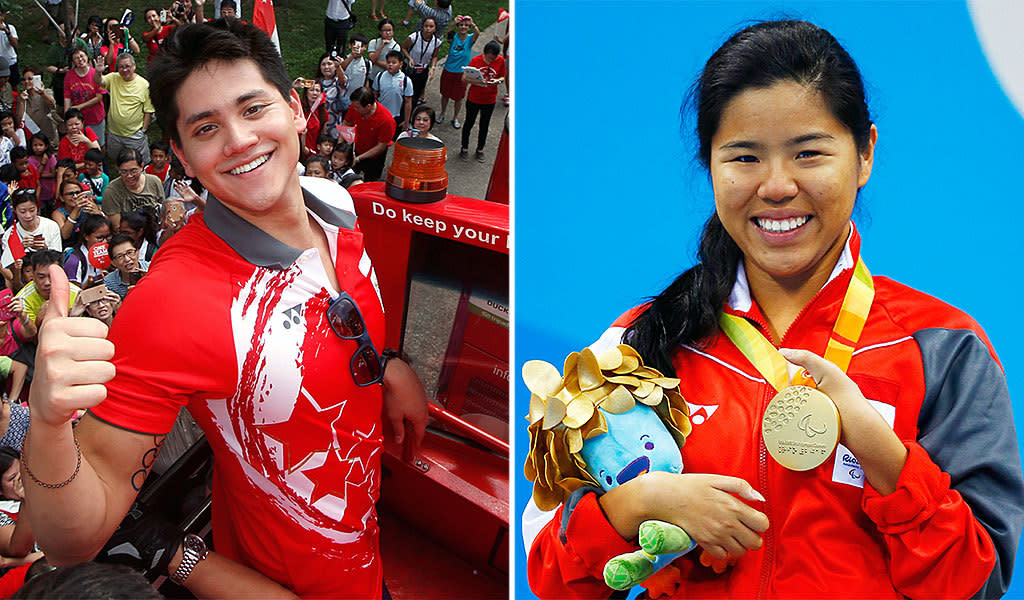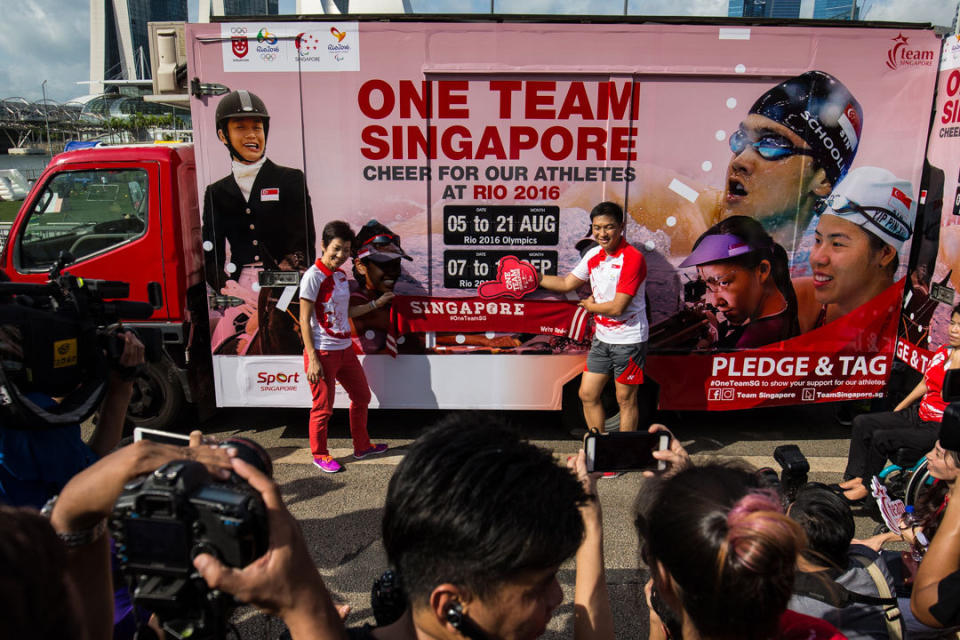High performance sports funding system needs to be sustainable, balanced: Grace Fu

Joseph Schooling’s historic Olympic triumph, along with Yip Pin Xiu’s Paralympics double-gold exploits, have been a “game-changer”, said Fu. (Photos: Reuters)
In the wake of Singapore’s recent Olympic successes, there has been an increased belief in local athletes that they can go on to succeed on the world stage.
But the High Performance Sports (HPS) system, which aims to provide national athletes with the best possible support to pursue such ambitions, has to remain sustainable in order to be effective, according to Minister for Culture, Community and Youth Grace Fu.
Fu, who was speaking at a local media briefing on Friday (30 September) morning about the HPS alongside Sport Singapore (SportSG) chief executive officer Lim Teck Yin, noted that the system has yielded success but needs to be continually “worked on” to ensure more benefits can be reaped.
She explained that Joseph Schooling’s historic Olympic triumph, along with Yip Pin Xiu’s Paralympics double-gold exploits have been a “game-changer” and the government is keen to support more athletes in their quest to be the best.
“We want Singapore to be a place where determined, driven and aspiring athletes can succeed on the world stage and we want more to be given the opportunity,” she said.
“I think MCCY is really looking at how we can develop… a strong pipeline allowing more sports and athletes to have the opportunities to give competitive sports at the world stage a shot.
“We would like to do more but it has to be a sustainable system because, working with finite resources, we have to see how best we can apply them in the most effective way to support the journey of this group of aspiring athletes.”

Fu (left) and Minister for Social and Family Development Tan Chuan-Jin at an event in July to honour Team Singapore athletes taking part in the 2016 Olympics and Paralympics. (Photo: Yahoo Newsroom)
Non-elite athletes and sports also important
Being sustainable means tailoring programmes to individual athletes’ needs and ensuring “stability and comfort” can be provided throughout the journey, which can span years.
Currently, there are around 1,500 national athletes – able-bodied and para-athletes – who are carded by the Singapore Sports Institute. This means they receive various forms of support, such as financial stipends and medical care, according to their level of competitiveness. Of that group, 72, including eight para-athletes, are on spexScholarships – the pinnacle level of support to groom medal prospects at the Asian, world and Olympic levels.
But a focus on high performance does not mean non-spex athletes should be neglected, said Lim, as those who do well at regional events like the SEA Games or excel in non-Olympic sports do their part in boosting national pride, too.
“I also want to highlight the balance that we constantly have to manage between a narrow focus and a broader base,” he said. “The balance is always being… reviewed continuously because we know what the available resource pool is.”
As such, campaign-funding and other annual grants, such as the “Final Push” programme for last year’s SEA Games that gave over 200 athletes extra funding, allow them to “give weight” to these athletes.
Constant assessment, call for corporates to step up
This means that there will always be “adjustment and fine-tuning” to the HPS system to ensure it can keep up with the various objectives of the athletes.
“We are always asking ourselves ‘Are we doing enough, are our priorities and funds allocation correct?’” Fu asserted.
“It’s a formula that we will always review every year; maybe in a bigger way, once in a few years… in the next few months, definitely we’ll be doing a lot of soul searching and thinking.”
Fu and Lim also encouraged the corporate sector to “step up” when it comes to rewarding athletes who have done well. A public debate was ignited following Yip’s gold-medal feats, as many clamoured for her to also receive the $1million that Schooling did.
“On the subject of rewards, there’s a lot more space there not just for government to play, but other people to play,” Lim said.
Fu added: “I think (for) awards, rewards, sponsorship and endorsements, that’s where corporate Singapore really has a great role to play, and I encourage all to have that discussion with SNOC and SNPC (the Olympic and Paralympic councils), to see how we can support the athletes in a more holistic way.”
The athletes can also help themselves by learning to engage with the public and raising their own profiles, such as speaking to schools or giving back at community events. Lim noted that athletes are becoming more comfortable with doing so, although more can still be done to encourage them.
“We play a role in nurturing athletes to understand that they are there social icons, national heroes, and yes we would like to see them come out more to speak,” he acknowledged.


